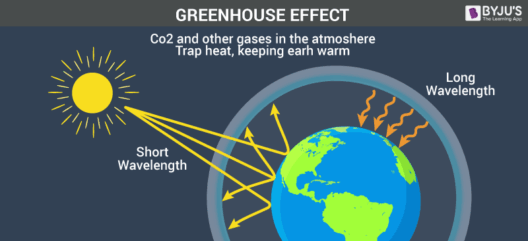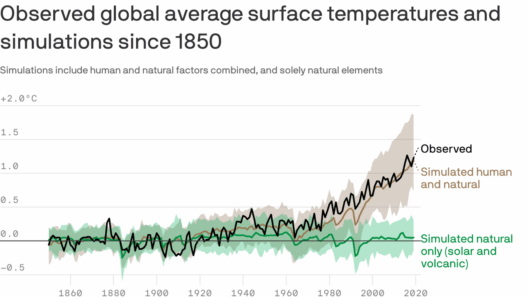In the context of the current climate crisis, the question of whether Florida’s Governor Ron DeSantis believes in global warming looms large. His position has set the stage for a broader examination of leadership amid an environmental upheaval. Florida, often dubbed “the Sunshine State”, finds itself at the nexus of climate challenges, ranging from rising sea levels to the inexorable intensity of hurricanes. This inquiry seeks to unearth the nuanced layers of DeSantis’s stance on climate change and how it influences both policy and public discourse.
The juxtaposition of DeSantis’s rhetoric against the backdrop of Florida’s fragile ecosystem is as stark as the contrast between a vibrant coral reef and bleached, lifeless stone. While many political figures embrace the narrative of climate action, DeSantis navigates a different course, perhaps influenced by the ideological currents of his party. His administration’s actions—or lack thereof—yield a perplexing schema: does he perceive the reality of global warming through a lens of skepticism, or is his approach a strategic maneuver aimed at appealing to a specific voter base?
In examining his policies, it is imperative to consider the multifarious impacts of climate change on Florida. With an extensive coastline and a multitude of ecosystems, Florida is uniquely vulnerable. DeSantis acknowledges the presence of climate-related issues, yet his approaches often seem inconsistent. Words matter, and the subtleties of his statements reveal a reluctance to fully embrace the consensus that global warming is an urgent crisis. Such ambivalence can be likened to a ship caught between two tides—half-hearted acknowledgment without firm commitment.
Under DeSantis’s leadership, Florida has indeed taken steps toward environmental resilience, particularly in response to hurricanes and flooding. For instance, funding for infrastructure projects aimed at mitigating storm damage has been allocated. However, these endeavors often appear reactive rather than proactive, akin to placing a band-aid on a gaping wound. The essence of climate science demands proactive measures—an arsenal of strategies firmly rooted in understanding and accepting climate change as an existential threat.
Moreover, DeSantis’s stance on climate issues finds its most vivid expression through his engagement with legislation. During his tenure, there have been instances where the language surrounding climate change has been meticulously crafted to avoid direct acknowledgment of global warming’s anthropogenic factors. The Governor has often leaned towards adaptation strategies rather than aggressive mitigation plans. While adaptation is undoubtedly necessary, it should not eclipse the imperative for a robust climate agenda that addresses the root causes of climate change.
The metaphorical façade of “climate change awareness” in DeSantis’s Florida reflects a broader societal hesitation to fully embrace environmental stewardship. Released reports on climate impacts often come accompanied by a public relations gloss that emphasizes economic growth and opportunity in clean energy sectors—yet these narratives frequently downplay the critical urgency of implementing comprehensive climate policies. The prioritization of economic growth at the expense of environmental stability resembles the proverbial “canary in the coal mine”—ignoring the cracks beneath the surface until the inevitable collapse occurs.
DeSantis’s leadership style embodies a complex tapestry woven from threads of conservativism and economic pragmatism. His administration has introduced initiatives purportedly aimed at protecting Florida’s environment, but critics argue these do not equate to a genuine commitment to combating climate change. Instead, the legislative measures can sometimes resemble gestures rather than tangible changes—tokens in a landscape fraught with peril, obscuring the dire need for substantial action.
A particularly contentious moment came when DeSantis signed an executive order to establish a “Florida Resiliency Plan,” which ostensibly aimed to address climate change impacts. However, this plan received criticism for its lack of enforceable mandates and insufficient funding. Observers noted a parallel with the concept of a mirage—appearing substantial from a distance but dissipating upon inspection. Florida’s own citizens deserve far more than what appears to be a half-measure in the face of an escalating crisis.
In matters of environmental policy, the clarity of vision is paramount. Approaching climate change with a blend of optimism and unwavering commitment is essential. A leadership strategy rooted in ambiguity and equivocation does not fortify Florida’s environmental future; instead, it creates an edifical structure susceptible to collapse under pressure. The unique appeal of the Sunshine State lies not just in its weather but in its natural beauty and biodiversity, both of which face existential threats from climate change. Protecting these assets should transcend political lines.
Forward momentum in addressing climate change must be predicated upon robust dialogue and unwavering resolve. Leaders—especially those governing regions as profoundly vulnerable as Florida—must not shy away from the undeniable realities that threaten their constituents’ livelihoods. Progress requires an acknowledgment and acceptance of global warming as an integral part of any viable policy framework. Only then can the Sunshine State truly shine, illuminating a path forward that embraces sustainability and resilience as core tenets of governance.
In conclusion, the inquiry into Ron DeSantis’s beliefs about global warming encapsulates a larger conversation about leadership in an age of environmental reckoning. The quality of governance, particularly in relation to climate change, cannot rest on ambiguous rhetoric or superficial commitments. Instead, it must embrace a foundational truth: acknowledging the climate crisis is the first step in forging a resilient future. As Florida stands at the forefront of this battle, the clarion call for decisive action has never been more urgent.







